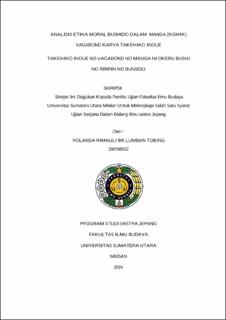| dc.contributor.advisor | Sihombing, Amin | |
| dc.contributor.advisor | Alimansyar | |
| dc.contributor.author | Tobing, Yolanda Rimauli Br Lumban | |
| dc.date.accessioned | 2025-05-05T07:32:59Z | |
| dc.date.available | 2025-05-05T07:32:59Z | |
| dc.date.issued | 2024 | |
| dc.identifier.uri | https://repositori.usu.ac.id/handle/123456789/103617 | |
| dc.description.abstract | This thesis aims to analyze the moral ethics of Bushi as reflected in the manga
Vagabond by Takehiko Inoue, using the theoretical approaches of ideology and the
sociology of literature. In Vagabond, Bushi values are revealed through the journey
of the main character, Miyamoto Musashi, who undergoes a transformation in his
views on life, honor, and death. Ideology theory is employed to identify how Bushi
values are conveyed as an ideology shaping the behavior and thoughts of the
characters within the social context of Edo-period Japan. Additionally, the
sociology of literature theory is applied to analyze the relationship between the text
and its social context, and how societal conditions influence the interpretation and
application of Bushi moral ethics. Through this analysis, it is hoped to gain a deeper
understanding of the relevance of Bushi moral ethics in everyday life and how these
values are internalized within Japanese culture. | en_US |
| dc.language.iso | id | en_US |
| dc.publisher | Universitas Sumatera Utara | en_US |
| dc.subject | Bushi Samurai Manga Vagabond | en_US |
| dc.title | Analisis Etika Moral Bushido dalam Manga (Komik) Vagabond Karya Takehiko Inoue | en_US |
| dc.title.alternative | An Analysis of the Ethics and Morality of Bushi in Takehiko Inoue’s Manga Vagabond | en_US |
| dc.type | Thesis | en_US |
| dc.identifier.nim | NIM200708032 | |
| dc.identifier.nidn | NIDN0003046007 | |
| dc.identifier.nidn | NIDN0003117503 | |
| dc.identifier.kodeprodi | KODEPRODI79204#Sastra Jepang | |
| dc.description.pages | 77 Pages | en_US |
| dc.description.type | Skripsi Sarjana | en_US |
| dc.subject.sdgs | SDGs 4. Quality Education | en_US |


